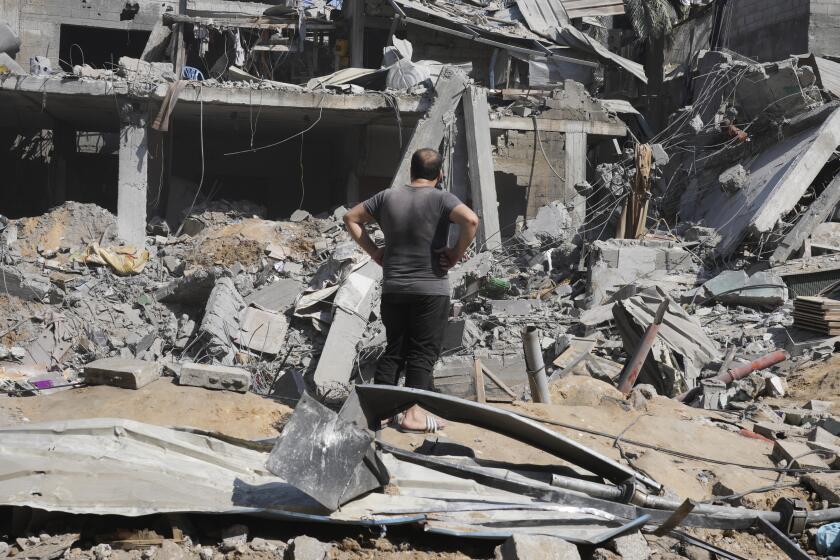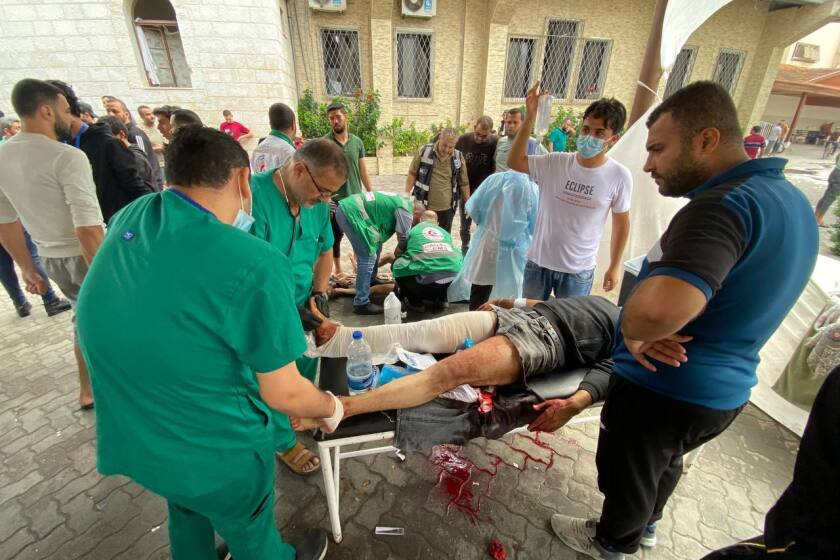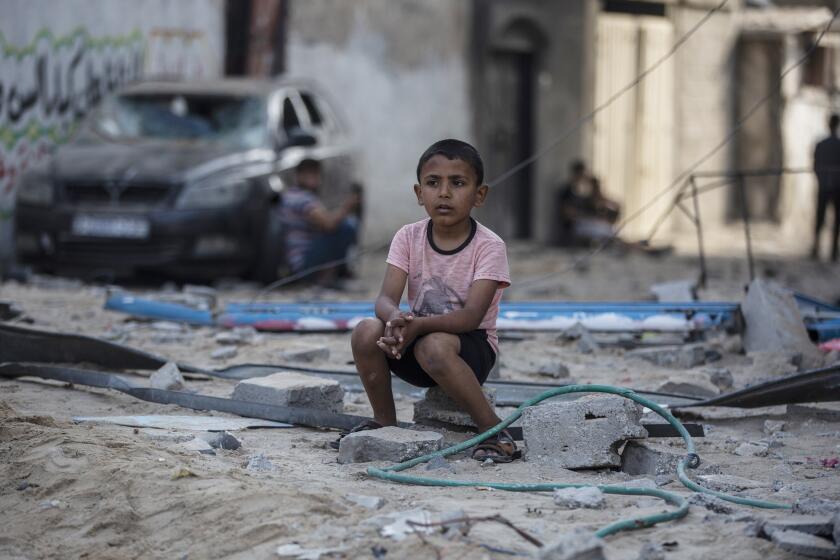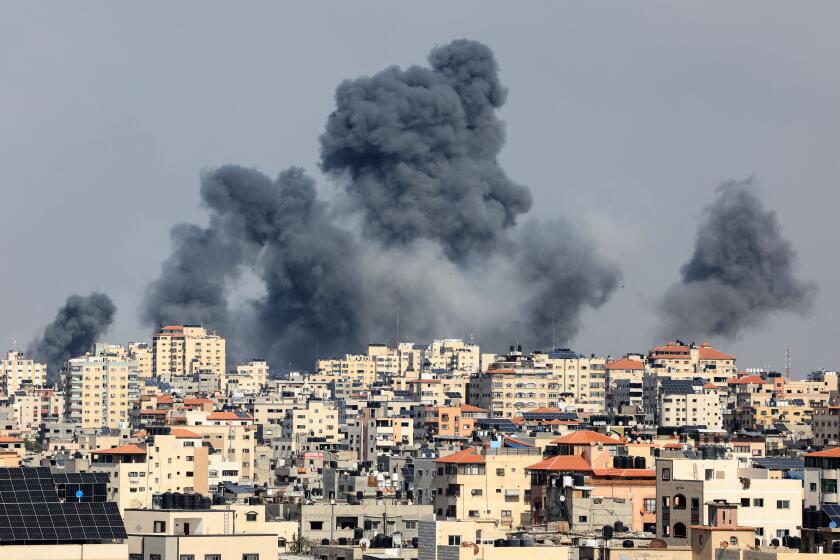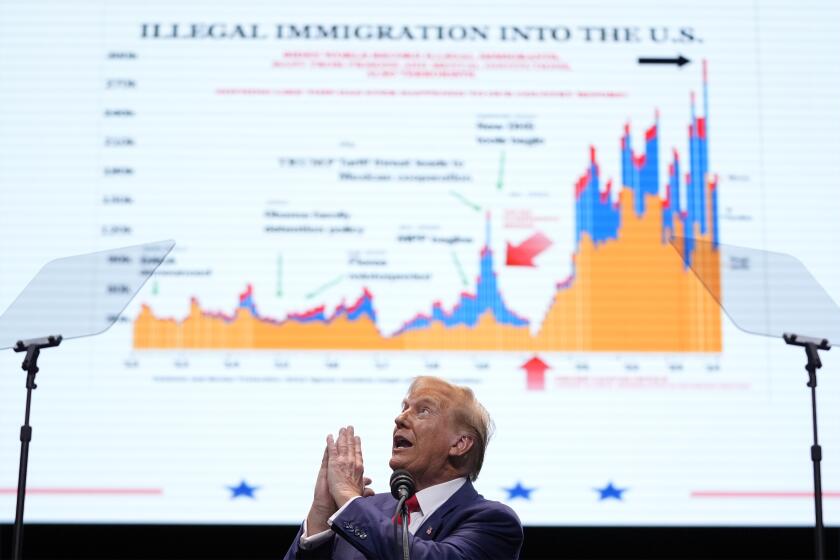Opinion: I’m the child of a Holocaust survivor. I know the trauma inflicted on Gaza will last for generations
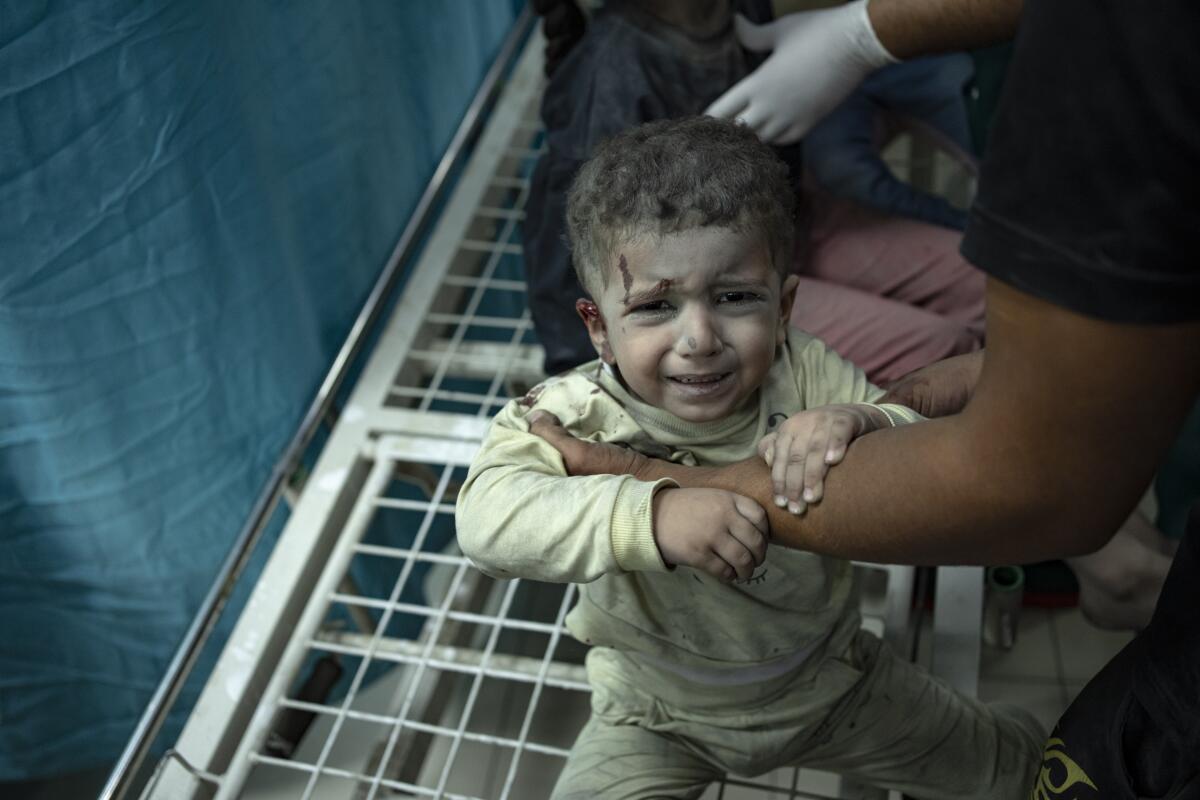
- Share via
Nearly 82 years ago, my father was born in Nazi-occupied Belgium. When he was only 3 weeks old, his own father, Max, was captured and murdered by Nazis; my dad survived because he was hidden by a series of Christian foster homes. I was born in a peaceful time and place — Victoria, Canada, in 1974 — but my own life was shaped by those events that happened decades before my birth.
As I write this, more than 11,000 Palestinians have been killed in Gaza, including 4,000 children. According to Save the Children, more children have been killed in Gaza over the last few weeks than were killed in each of the last three years in global conflicts. I know firsthand that atrocities like this tear a hole through history that will take more than one generation to heal.
My sisters are taking refuge north of Gaza City in a hospital and a school operated by the United Nations, but no place in Gaza is safe.
For the record:
9:40 p.m. Nov. 18, 2023An earlier version of this article incorrectly compared the number of children killed in Gaza and the number killed in global conflicts. More children have been killed in Gaza in the last few weeks than were killed in global conflicts in each of the last three years, not combined.
My father still ran our family as if we were fleeing from the Gestapo. We lived in tents without running water, and moved every six months. As an adult, I was diagnosed with a neurological form of lupus, a disabling autoimmune disease connected to early trauma. Women with PTSD have been found to be nearly three times as likely to develop this disease than those without significant trauma. I was susceptible, in part, because of my chaotic childhood.
There is also epigenetic evidence that mass traumas like the Holocaust affect the genes of the children and grandchildren of survivors on a cellular level, leaving us predisposed to chronic disease. Political violence is a disability justice issue because it leads to physical and psychological disabilities immediately, and will continue to seed them for generations to come.
In Gaza, sick and disabled people, including children, are at the front lines of attacks. Hussam Abu Safyiaa, a pediatrician in Gaza, writes: “Without an urgent resupply of fuel, the lights will go out permanently, and our hospital could turn into a morgue.”
Gaza hospitals are collapsing. As a mother there, I wonder why we bring children into this world if they will suffer.
My father was also deprived of medical care as a child, and that legacy scarred him for life physically and psychologically. While he was in hiding, he got sick with whooping cough; the sound of his coughing threatened his own life and the life of the family who sheltered him from Nazis. To spare everyone, he was taken to a Catholic orphanage in the countryside of Belgium.
There, nuns cared for him without medicine. When he recovered, a young nun returned him in the dead of night to the doorstep of his foster family. By then, he was permanently left with respiratory issues and chronic bronchitis. His other wounds were harder to measure, but just as real. As a parent, my dad was hilarious, brilliant and emotionally distant; he had terrifying rages, and little notion of what it meant to shelter children from danger.
Israel struck the Jabaliya refugee camp in the Gaza Strip Tuesday. Palestinians have experienced a long cycle of displacement within and beyond Israel’s borders.
My dad was one of the lucky ones. He survived, and at 9 years old he was reunited with his mother and new stepfather in Los Angeles. He went on to Fairfax High, a historically majority-Jewish school. His classmates included the children of Hollywood writers and actors who had been blacklisted by McCarthyism. In 1967, the Summer of Love, he met my mother at a party in the Hollywood Hills. They became ardent anti-Vietnam war protesters, along with a number of other Jewish radicals.
Growing up, this was what Judaism meant to me: intellectual dissent and peace activism. In rabbinical school, I learned that according to ancient Jewish holy texts, saving a single life is the same as saving a whole world, because each of us contains distinctive cities of relationships, irreplaceable geographies of passions, and deep oceans of memories.
As Israel is poised for a ground invasion of Gaza, and bombing continues, people fear that the goal is to empty the place of Palestinians.
That is one reason more than 140 of my colleagues and I are calling for peace as a part of Rabbis for Ceasefire, along with a swelling Jewish peace movement. However, most major American Jewish organizations support this invasion. It is a profound moral injury for me that the community that taught me to value resistance, peace and the sanctity of each human life is supporting violence and silencing dissent. Many rabbis and other Jewish professionals I know are afraid to speak out for peace and risk being ostracized from family or synagogues or lose funding for their nonprofit organizations.
Now as Gaza is being bombed into a place of dust and ashes, my father is entering the last phase of his life in a hospital room in Toronto. My dad’s life once again has tapered to living only within a narrow room, while atrocities swirl outside. However, this time, unlike those who are gravely ill in Gaza, my dad is well cared for. He is warm and dry, held and loved. When the time comes, there is enough fuel and food to ensure that he dies with dignity and ease. My dad didn’t enter the world being treated like a person, but he is leaving it being cared for with humanity. Everyone deserves this.
Elliot Kukla is a rabbi, writer and activist based in Oakland. He is the author of the forthcoming children’s book “The Lazy Day.”
More to Read
A cure for the common opinion
Get thought-provoking perspectives with our weekly newsletter.
You may occasionally receive promotional content from the Los Angeles Times.
